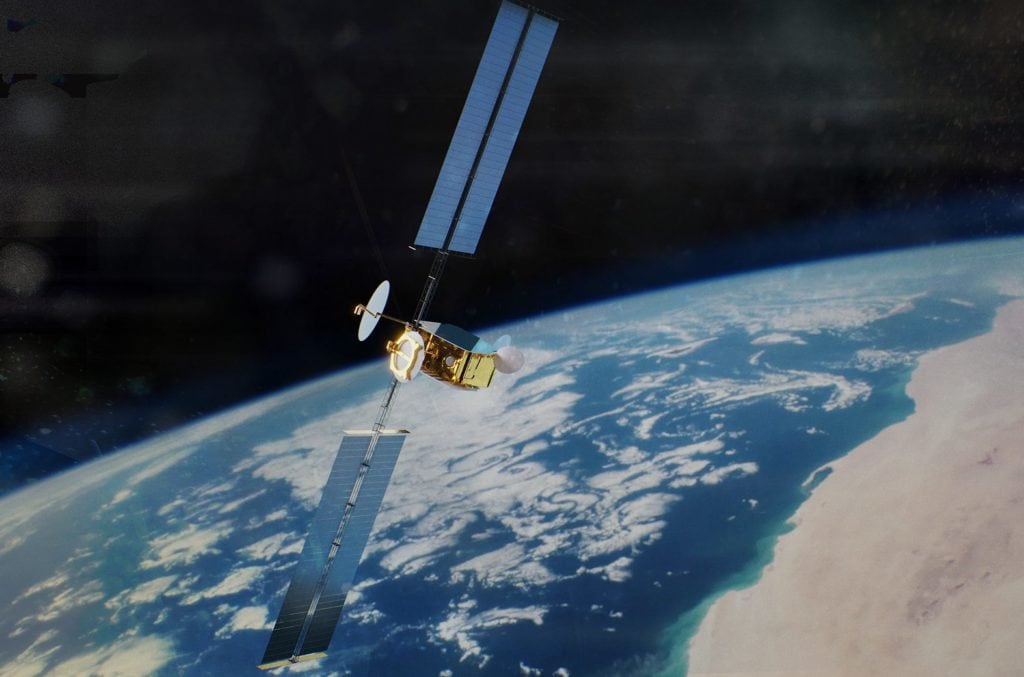Airbus to Develop Next-Gen Satellites for Inmarsat’s Global Xpress Network
Share

Having achieved global coverage with its first five Global Xpress satellites, Inmarsat has revealed what chief technology officer Peter Hadinger referred to as “strategic” plans to roll out three next-generation satellites across the network to “fill in the places where there’s high demand.”
Airbus Defence & Space (Airbus) is to design, manufacture and build a new generation of geostationary Ka-band satellites for Inmarsat’s Global Xpress (GX) network. GX7, GX8 and GX9 are each slated to deliver twice the total capacity of the entire current GX network, enabling the delivery of multiple gigabits per second to users’ devices.
The new satellites will be the first to make use of Airbus’ OneSat product line, which is based on a standard, modular design to save on both cost and time to market. All three satellites are scheduled to be in orbit by the end of 2023, with GX7 and GX8 due to be launched in the first half of that year, and GX9 in the second half.
According to Inmarsat, the GX7, GX8 and GX9 satellites will be capable of creating thousands of dynamically formed, smaller and more precise beams than its current GX satellites to deliver capacity to high-demand areas, such as airport hubs, when needed. Since the new satellites will feature on board processing capabilities and active antennas, Inmarsat has said it can use software to reconfigure them every few seconds with a view to relocating capacity in line with real-time flight patterns.
GX7, GX8 and GX9 will build on Inmarsat’s existing GX network. Four satellites are already in operation, and three more are set to be launched over the next three years, beginning with the GX5 satellite later in 2019, followed by the GX6A and GX6B satellites between 2020 and 2021.
The next-generation of satellites was developed predominantly due to the demands of the airline industry, which is seeing a growing number of connected devices in the cabin, as well as more passengers using these devices to access data-rich applications. In the aviation market specifically, Inmarsat currently provides in-flight connectivity for 1,580 aircraft under its GX contracts, but the company predicts it will do so for a further 3,000 aircraft in the coming years.
“The key here is these satellites integrated into our network, into the smart stuff that’s on the ground.” – Philip Balaam, Inmarsat Aviation
During a webinar discussing the announcement, president of Inmarsat Aviation Philip Balaam said, “The key here isn’t the new satellites. The key here is these satellites integrated into our network, into the smart stuff that’s on the ground. Someone else could buy satellites like this and put them up and they would get nowhere near the benefit that we can generate because of our global mobile system.” Balaam emphasized that Inmarsat is heavily investing in its ground infrastructure alongside GX7, GX8 and GX9.
The new GX technology will be backward compatible with existing terminals, so existing GX Aviation customers, including Garuda Indonesia and Norwegian, will automatically benefit from future service enhancements. Each of the three new satellites will be equipped for remote upgrades to ensure they’re future-proofed.
Once GX7, GX8 and GX9 have been launched, Peter Hadinger, CTO of Inmarsat, estimates that the time between a new satellite order placed by Inmarsat, from Airbus, and its subsequent launch will narrow to just 18 months. Balaam explained, “This allows us to invest in real market and customer needs, and that’s absolutely vital because one of the key metrics that we will all see over the coming years in this part of the industry as there is a shakeout, is return on capital.”
In a press release, Airbus’ head of Space Systems, Nicolas Chamussy, said, “We are launching the OneSat product line for our customer Inmarsat, following the successes of the Airbus-built Inmarsat-4 spacecraft, Alphasat, and the Inmarsat-6 satellites, which are currently under construction. This latest contract continues the long-standing innovation relationship between Airbus and Inmarsat.”


